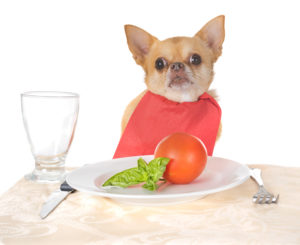
Many vegetarians have at some point been confronted with this question when it comes to giving their puppies meat when they do not consume it.
The answer is yes.
Puppies like humans can be omnivorous. This means they can convert certain foods into amino acids. Some of the proteins you can try include beans, milk, eggs, soy, corn, or whole grain.
Your puppy may take some time to adjust to a non-meat diet. You may find your puppy peeping through its diet with that look of “Where is the meat?”
The decision to change to a vegan diet is an important one for humans. You avoid slaughtering animals in an inhumane way; you also lower your risks of obesity, heart disease, and many other diseases that are associated with meat products. Puppies have various omnivorous characteristics that enable them to adapt to a vegan diet. These include:
- Their small intestines have the necessary gastrointestinal juices necessary for the conversion of amino acids in the proteins they consume.
- Their molars are flat like humans, and this helps them chew hard vegetables like carrots
- They also can also convert beta-carotene into Vitamin A
While the decision to provide a vegan diet for your puppy is a personal one, their cases where you find your puppy is allergic to proteins. According to Dr. Fox of US Humane Society, puppies can thrive on a purely vegan diet but is important that you supplement their diet with meat occasionally.
What are the risks of a vegan diet?
In the long term feeding your puppy, a vegan diet has some benefits that include reduced allergies, better coat, weight control, arthritis regression, increased health, cataract control, diabetes regression, lowers risks of cancer, and reduced chances of getting ticks and fleas.
If you do not balance the proteins well, your puppy may experience inadequate protein uptake – this is especially the case for mature dogs. When there is an imbalance, your puppy can get various heart problems. Proteins contain large amounts of Iron which is essential for bone formation in puppies. Should your puppy have issues digesting legumes and beans then it could be better for you to switch back to a meat diet.
To make it work for your puppy, supplement the vegan diet with some meats that have been slaughtered in humane ways. Also, ensure that at all times the puppy’s vegan diet has all the essential vitamins and proteins.
It is estimated that dogs need an intake of 1,000 calories of protein – around 25 grams of meat per day. You can achieve this by including vegan meals that have high protein content like black beans, chickpeas, and spinach, among others. Some of these like black beans have more protein content than meat. Eggs will also help you keep the balance between L-carnitine and taurine amino acids. Most of the Vitamins are often found in vegetables so there will not be a shortfall there, but there is one Vitamin that can only be sourced from meats – Vitamin B12.
Flea and Tick Prevention
Even if a dog follows a vegan diet, it’s still crucial to provide them with flea and tick prevention. Fleas and ticks do not choose hosts based on their diet, but rather proximity and availability. These parasites are opportunistic and will attach themselves to any suitable host they come across, whether the host consumes a meat-based diet or a vegan one. Besides, fleas and ticks can cause a variety of health issues in dogs, including skin allergies, irritation, infections, and in the case of ticks, serious diseases like Lyme disease and Rocky Mountain spotted fever. Therefore, regardless of a dog’s diet, flea and tick prevention is an essential part of maintaining their overall health and well-being. We recommend a treatment that is suitable for all breeds of dogs, that is highly effective in killing fleas and ticks, and protects the dog from flea and tick-borne diseases. Hurry, Buy Now & Get 2 Free Doses! Extra 12% Off + Free Shipping Worldwide. Coupon: BVCFTS12
How to change the puppy’s diet
It is not good to change your puppy’s food suddenly. Do your research on various diet plans and choose one that will suit your puppy. Change the diet gradually while paying attention to the amount of essential proteins, minerals, and vitamins in the meal. Reduce the meat content gradually while replacing it with a vegan protein. After some time your puppy will get used to the change.
Your puppy may resist this diet at the beginning, and this requires you to be a bit creative with your menus. Try to motivate your puppy by rewarding them with treats.
While the decision to go vegan is purely personal for humans, dogs tend to crave meat, and you can opt to add some meats occasionally. Should you realize that your puppy is getting affected by the change in diet, it would be ideal to consult your veterinarian. The vet can recommend a better diet that is ideal for your pet or recommends that you return to a meat diet.
Conclusion
It is possible for your puppies to go vegan. Dogs can digest vegetables like humans. For you to succeed in a purely vegan diet for your puppy, make the change gradually and ensure that all the meals that you provide meet the puppies daily content of proteins.
Author’s Bio:
 Deinah Storm is a pet lover from the US that’s had cats and dogs all her life. When she’s not walking the dogs with her family, she spends time writing informational and interesting blogs about pets to share with pet lover communities.
Deinah Storm is a pet lover from the US that’s had cats and dogs all her life. When she’s not walking the dogs with her family, she spends time writing informational and interesting blogs about pets to share with pet lover communities.